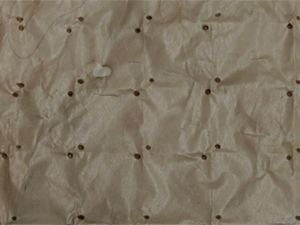



Date:02/09/16
 The body is a good generator of heat, and retailers have figured out ingenious ways of trapping all that warmth with all sorts of coverings made from natural and synthetic materials.
The body is a good generator of heat, and retailers have figured out ingenious ways of trapping all that warmth with all sorts of coverings made from natural and synthetic materials.
But keeping the body cool without external help from fans and air conditioning units is a much bigger challenge. The problem is, any material that is porous enough to release the body’s thermal energy is generally transparent—not a helpful feature in clothing.
Yet scientists from Stanford University report they might have finally cracked the problem of self-cooling fabric by finding material that can release heat yet remain opaque in the wavelengths visible to the human eye.
In a paper published in Science, they describe working with, of all things, the same material used in food plastic wrap. To give it breathability, they treated it to contain just the right-sized micro-pores that can release the heat generated from the skin, yet remain opaque. The researchers also treated the material with water-wicking features so it also released moisture, another way to keep the skin cool.
When they tested their fabric against cotton and synthetics on a body-heat simulator, they found that the innovative plastic-based material kept the underlying “skin” up to three degrees cooler than the other fabrics.
The group says more research is needed to make the manufacturing process more efficient and less costly, but the scientists are hopeful that will happen in coming years. If they’re successful, it could mean not just better comfort for people in hotter climes, but possible reductions in energy costs as well, if the material is used in buildings and tents. If fabric-cooled individuals aren’t as inclined to turn on fans and AC units, that could lead to energy savings as well.
Air-conditioned shirts will soon be a thing
 The body is a good generator of heat, and retailers have figured out ingenious ways of trapping all that warmth with all sorts of coverings made from natural and synthetic materials.
The body is a good generator of heat, and retailers have figured out ingenious ways of trapping all that warmth with all sorts of coverings made from natural and synthetic materials.But keeping the body cool without external help from fans and air conditioning units is a much bigger challenge. The problem is, any material that is porous enough to release the body’s thermal energy is generally transparent—not a helpful feature in clothing.
Yet scientists from Stanford University report they might have finally cracked the problem of self-cooling fabric by finding material that can release heat yet remain opaque in the wavelengths visible to the human eye.
In a paper published in Science, they describe working with, of all things, the same material used in food plastic wrap. To give it breathability, they treated it to contain just the right-sized micro-pores that can release the heat generated from the skin, yet remain opaque. The researchers also treated the material with water-wicking features so it also released moisture, another way to keep the skin cool.
When they tested their fabric against cotton and synthetics on a body-heat simulator, they found that the innovative plastic-based material kept the underlying “skin” up to three degrees cooler than the other fabrics.
The group says more research is needed to make the manufacturing process more efficient and less costly, but the scientists are hopeful that will happen in coming years. If they’re successful, it could mean not just better comfort for people in hotter climes, but possible reductions in energy costs as well, if the material is used in buildings and tents. If fabric-cooled individuals aren’t as inclined to turn on fans and AC units, that could lead to energy savings as well.
Views: 510
©ictnews.az. All rights reserved.Similar news
- The mobile sector continues its lead
- Facebook counted 600 million active users
- Cell phone testing laboratory is planned to be built in Azerbaijan
- Tablets and riders outfitted quickly with 3G/4G modems
- The number of digital TV channels will double to 24 units
- Tax proposal in China gets massive online feedback
- Malaysia to implement biometric system at all entry points
- Korea to build Green Technology Centre
- Cisco Poised to Help China Keep an Eye on Its Citizens
- 3G speed in Azerbaijan is higher than in UK
- Government of Canada Announces Investment in Green Innovation for Canada
- Electric cars in Azerbaijan
- Dominican Republic Govt Issues Cashless Benefits
- Spain raises €1.65bn from spectrum auction
- Camden Council boosts mobile security





















